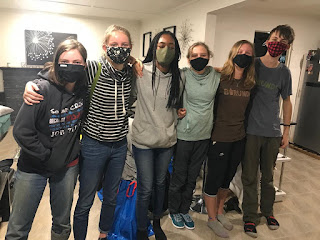26.1.21
The Patience-Producing Publishing Process
21.1.21
The Hardest Thing
Our life in Kibuye is pretty comfortable. We have a nice house with appliances, indoor plumbing, and tile floors, all luxuries that most Burundians don’t have. We (now) have relatively reliable power, water, and internet. So when people ask me, “What’s the hardest thing about living in Burundi?”, my answer has always been pretty immediate — being away from family. Yes, for sure there are a host of other challenges including cultural and language barriers, limited resources, and conflict. But the hardest for me has always been missing out on time with family and sharing special events like birthdays, holidays, and family vacation. We’ve had nieces and nephews that we never got to hold as babies. While I appreciate how travel and communication are much easier than they once were, that separation has always felt like the biggest sacrifice, only now the scope has widened.
Last weekend, 3 Kibuye families dropped off their kids at Rift Valley Academy (RVA) in Kenya, a boarding school for missionary kids. The Watts were the first brave souls from our team to embark on this venture. Faders and Sunds sent their oldest girls there last year. This year, it was our turn too. For 4 years, I have watched these parents grieve sending their kids away and navigate parenting from afar. I’ve listened to their pain and watched them weep. I don’t know why it surprised me how incredibly hard it was to leave our daughter Elise (8th grade) last Friday.
And yet as our family considered the situation, we remained convinced this was the right choice for Elise. In her 7 academic years in Burundi, she’s had an age mate twice for less than a total of 1-½ years and both were boys. Over the last few years, one after the other of the older kids she was grouped with have gone away to RVA. She’s longing for friendship with others her age in her heart language and we can’t provide that for her here in Kibuye. She needs discipleship, social interaction, extra-curricular opportunities, and a larger community.
Lord willing, tomorrow I’ll be getting my 4th covid test in 12 days (technically 5 since one guy decided to give me both throat & nose tests in the same sitting) and after a negative result the following day, will be released from a 7-day quarantine at a hotel in the capital city. I’m looking forward to seeing John and the boys again but I know that grief will linger as I walk by Elise’s empty (and now always clean!) bedroom, set 4 plates on the table for meals instead of 5, or realize that I don’t need to order as much produce each week or do as much laundry.
Please pray for Matea (11th), Anna (10th), Micah (9th), and Elise (8th) as they transition to a new year at RVA (and the Sund kids too). While Micah & Elise are the new ones this year, even returning students have adjustments to make as school is so different with masks and social distancing. Pray that they would grow academically, socially, spiritually, and emotionally. And don’t forget to pray for their parents too.
15.1.21
Still Learning
As for many people this year, we've had to be quite flexible to figure out a way forward with school in the Covid era. We are very thankful that we've had the capacity to continue with in-classroom schooling! And as most of you know, our teachers arrived, safe and sound, in early December so since Christmas Break we've been "back to normal" around here. One thing that we've done in previous years that we've been able to continue this year is one of the kids' favorites, Learning Experience Day. Once a month we take a break from regular school in order to focus on one specific subject, learning through nature walks, videos, games, and projects. In past years we've explored everything from construction and solar panels to chickens and germs. I thought I'd give everyone a brief recap of our themes from this year so far. Enjoy...we sure did!
September: Owls and Raptors. A throwback to a similar day from 2017, we were able to observe both a barn owl and several local hawks, in addition to learning about bird beak adaptations, dissect owl pellets, and sew cute baby owls from socks!
 |
| can you spot the hawk? |
 |
| owl pellets |
 |
| Bird "beaks" |
October: Rocks. While unable to actually tour our local quarry due to safety restrictions, we hiked to an overlook to observe heavy machinery mining and making gravel for the road. We also had fun categorizing and observing rocks and minerals, and wrapped up by creating artwork and stories from rocks.
 |
| the quarry is behind us in this picture...dust from the gravel creation |
 |
| A little mascot we picked up on our rock walk |
 |
| Some story/rock art |
 |
| cow getting milked |
 |
| look at the variety of specimens collected!! |

























